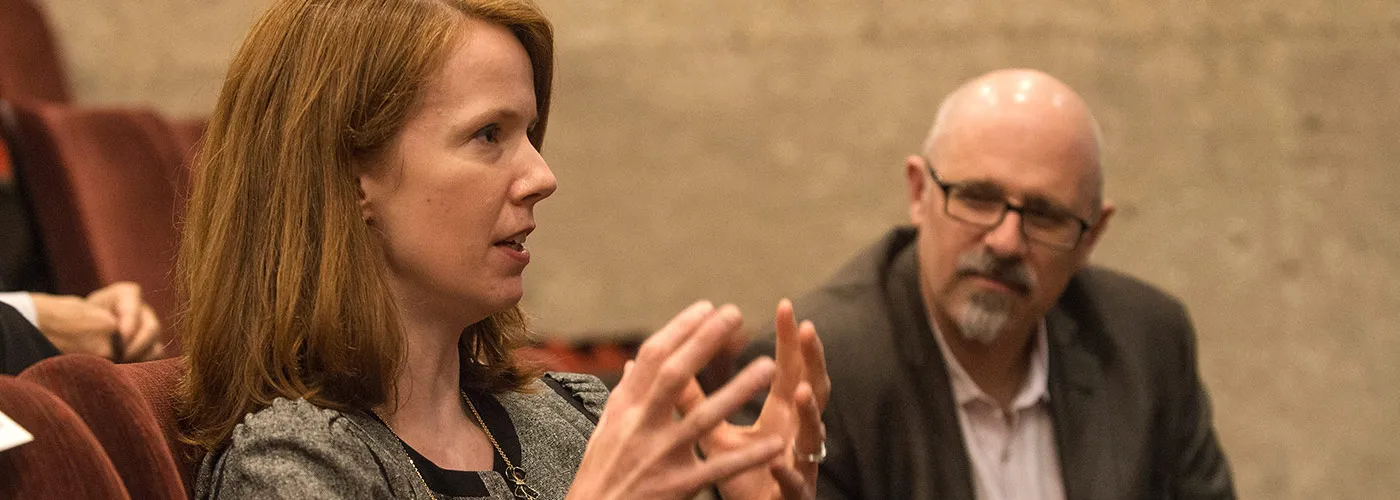LaCroix Awarded NEH Fellowship Grant for Study of the ‘Interbellum Constitution’

The National Endowment for the Humanities has awarded Professor Alison LaCroix a 12-month fellowship to advance her study of the constitutional discourse that roiled America between the War of 1812 and the Civil War—a project that challenges the conventional view that those years marked a lull between America’s “real” foundational moments. The resulting book, The Interbellum Constitution: Union, Commerce, and Slavery From the Long Founding Moment to the Civil War, will draw on LaCroix’s interdisciplinary expertise in American history and constitutional law to tell a nuanced and deeply human story of a nation caught between constitutional reverence and discord over the document’s unresolved issues.
“It was a remarkable time, and the overarching story is one about federalism, commerce, and concurrent power—but as carried out through real legal debates,” said LaCroix, the Robert Newton Reid Professor of Law and an associate member of the University’s Department of History. “And it’s a story that isn’t typically told this way—this period is often treated as a gap between the founding and the Reconstruction era. This fellowship is a chance to devote unbroken time to examining individual people and the discourse that unfolded among them, and I’m thrilled and honored to have been selected. Having the NEH’s support for a book-length project is a tremendous vote of confidence and an inspiration for the research and writing process.”
The highly competitive fellowship is among $12.8 million in grants awarded to 253 humanities projects across the nation, the NEH announced today. Of those, 74 are fellowships awarded to university and independent scholars pursuing advanced research.
“Alison is a deeply thoughtful and engaged scholar who combines expertise in history and constitutional law to give us new insights into the foundational principles of our country,” said Dean Thomas J. Miles, the Clifton R. Musser Professor of Law and Economics. “We are proud to see her work on the interbellum Constitution recognized, and we are eager to see where her research takes her.”
LaCroix’s work on the American constitutional debates that unfolded between 1815 and 1861 is, in many ways, a natural outgrowth of her 2010 book, The Ideological Origins of American Federalism (Harvard University Press), which examined the beginnings of American federal thought. Her new book, which is under contract by Yale University Press, picks up a few years later, as the last of the founders were dying and the republic was facing a dizzying array of economic, political, and societal changes: westward expansion; the development of the cotton gin, steam engine, and other technologies; the emergence of new political parties; a series of recessions; sectional disputes over slavery; and calls for racial and gender equality. The period was one of fighting, confusion, and contradiction, LaCroix said. On one hand, Americans revered the Constitution as the final words of their founders. On the other, they struggled to apply it, particularly when delineating between federal and state authority as policy issues like slavery and taxation took on increasing importance.
“There was a real sense that the union was fragile or even on the verge of collapse—they didn’t know how long it would succeed or even what success would look like,” LaCroix said yesterday, surrounded by stacks of microfilm related to the project. “The founders were dying off and, what’s more, things were very different from what they could have envisioned. So not only were interbellum Americans applying federalism, they were applying it to totally new and ever-changing sets of problems and dynamics.”
Despite the turmoil, historians have often treated the interbellum period as one of constitutional stasis, LaCroix said, noting the large gap between the ratification of the 12th Amendment in 1804 and the 13th Amendment in 1865.
“People have written about this period as if it isn’t part of the story because it didn’t generate any amendments,” she said. “But there were all these foundational cases from this period. There was McCulloch v. Maryland about the Bank of the United States in 1819, Gibbons v. Ogden about the commerce clause and steamboats in 1824, Osborn v. Bank of the US about federal jurisdiction also in 1824, and others. So how can we have a story that the Constitution didn’t change or that nothing interesting was happening when the Court was generating all these opinions? They weren’t just clarifying: these were real disputes on the line.”
The story, of course, has a strong human element, and some of LaCroix’s research has focused on reading accounts of individuals involved in the disputes and debates. She’s worked to include voices beyond lawyers and the male elite, including those of fugitive slaves, the wives of cabinet members, and others.
“One of the things I find really fascinating about this project is that I’m looking at particular people and trying to weave their stories together,” LaCroix said. “It means I spend time reading one person’s papers, and I get to know their handwriting and who they write to and how they write to those people.”
For LaCroix—who received her BA summa cum laude in history from Yale University, her JD from Yale Law School, and her PhD in history from Harvard University—the NEH fellowship presents an energizing boost.
“You spend so much time sitting in front of the microfilm reader or looking through the proverbial dusty volumes—and sometimes it really is a dusty volume—doing this stone-by-stone work,” she said. “It is wonderful to have this moment where you describe it to an audience … and then they say, ‘Yes, this is worth doing—and you should do it.’ It’s really just very exciting.”



